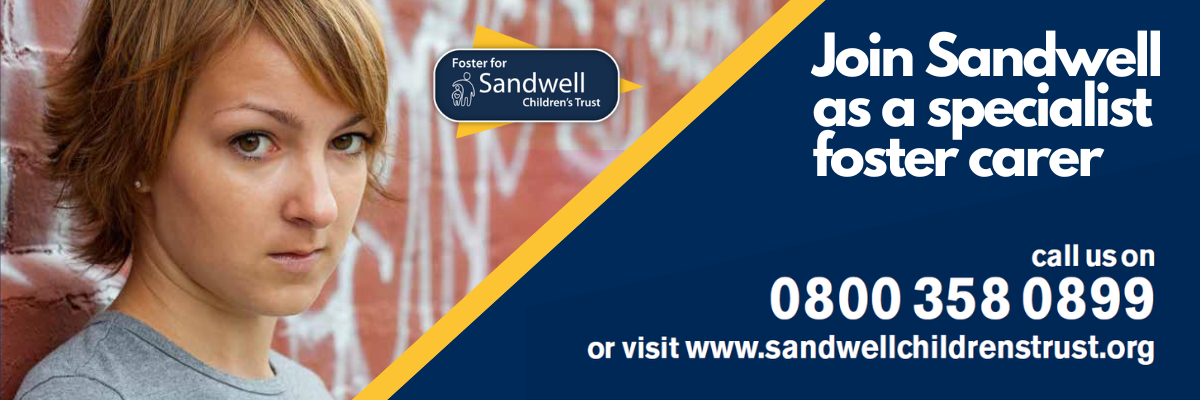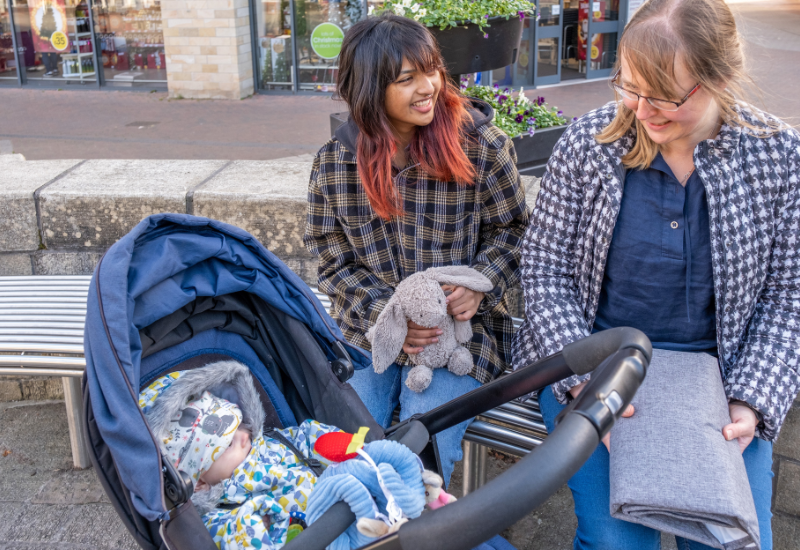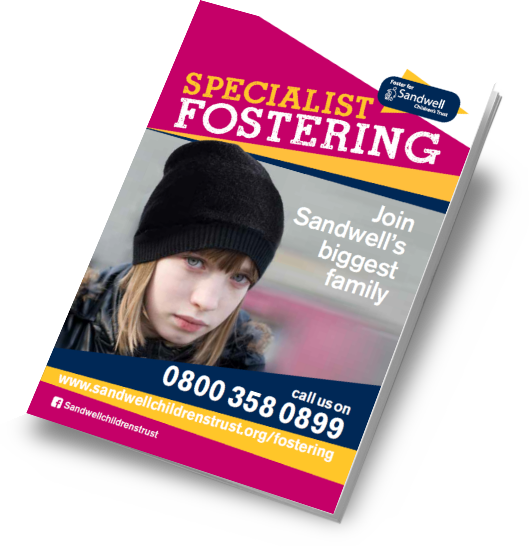Specialist Fostering

Sandwell have launched a brand-new specialist fostering scheme to help some of the most vulnerable children and young people across our borough.We are urgently recruiting carers specifically to foster within our specialist scheme. We need more people with existing experience and expertise in working with vulnerable young people who are likely to have experienced significant trauma, abuse or neglect to come forward and provide safe, stable and positive homes. Read on or Download the Brochure (PDF) |
We would especially like to hear from people who may have skills and experience from professional backgrounds.
For example: Foster carers who have previous complex fostering experience, individuals who have worked with young offenders, including probation or youth justice workers, police and prison officers, youth workers, teachers or medical professionals. Skills and experience from individuals with professional backgrounds will be valuable in ensuring young people receive the most specialist care from carers who are resilient enough in dealing with issues that affect young people.
All children and young people referred to the scheme are carefully matched to a specialist foster placement. It is essential that the foster carers commit to the child for the proposed duration of the placement, this is why we ask that at least one carer has no other form of employment whilst providing specialist care.
Specialist foster carers will not have anyone else living within their household under the age of 18 years and will only have one child in placement at any one time, so they can concentrate fully on the needs of that child.

Some children and young people’s experiences have been so difficult they need additional help and support. For example, a young person may need to be supervised closely, display complex behaviours, or find it hard to form positive relationships with others.
Our focus is on supporting the young people who are at risk of being placed in a residential setting or young people who have made significant progress while in residential care and would now benefit from a foster home environment.
Carers within the scheme are to provide supportive placements for children and young people with complex needs who need individual care. The children that are referred to this scheme are typically older children who have lived in a residential setting or are at risk of being placed in a residential setting. They may have had difficult or traumatic life experiences and display complex and challenging behaviours and need a supportive family home environment.

When John was placed in residential care he would go missing and refused to attend school, often becoming angry and frustrated leading him to lash out as he has not been taught how to understand his feelings and given the support to manage his emotions.
John has made extremely good progress over the last 12 months, he has engaged with therapeutic support and is now attending school on a daily basis. John has been attending football training and this has helped to build his confidence and self-esteem. John thrives when clear routines and boundaries are in place as they help him to feel safe.
John is ready to move into a foster family and needs a nurturing experienced foster carer to allow him to feel loved and supported.

A parent and child placement is a specialist type of fostering where a parent and their own child, often a young mother and baby, come to stay in your home to have extra support and guidance.

There are many reasons for a parent and child placement but most often, the primary benefit of parent and child fostering is to support the parent. It may be that a new mother is having difficulties looking after their new baby, and they may not have experienced great parenting themselves, or may have been in care themselves. This leads to them needing an experienced parental figure to help them become a better parent.
In other examples, the parent may have a learning difficulty or mental health challenges that cause them to have difficulties becoming a parent. The role of the carer is not to care for the child but to support the parent to care for their child.
During the parent and child’s stay with the foster family, an assessment will occur over the course of a three-month period in the foster family’s home. As a mother and baby foster carer, you will be specifically trained to facilitate this type of assessment, as well as having extensive skills in observation and recording.

Cassie and Amelia are 5-year-old twins who live at home with their parents. They have both been diagnosed with autism and will often pinch, bite and lash out in order to communicate.
Cassie has limited speech and Amelia is non-verbal, they struggle with loud noises and Cassie is a very picky eater. Parents are working hard with the twins and are meeting their needs on a day to day basis. Due to the high level of supervision and support needs of the girls, their parents often feel worn out and need regular breaks to allow them to recharge their batteries.
Cassie and Amelia need short break carers who can work with their parents to understand the girl’s behaviours and how to manage them. Short breaks will provide Cassie and Amelia with new experiences and offer their parents time to relax, knowing that their children are safe.

As a short breaks foster carer within our specialist fostering scheme you will provide children with disabilities a planned short term break away from their birth families or carers.
You’ll be offering specialist care to children with complex needs which can include physical disabilities, medical conditions or significant learning difficulties.
Short term breaks are an opportunity for children to gain new experiences and develop new relationships outside of their everyday environment.
It also allows the child or young person’s caregiver the opportunity to take a break from their caring responsibilities and to recharge their batteries.

Samina and Zain moved into a parent and child foster home when Zain was 6 weeks old. Samina was struggling to wake up in the night to take care of Zain and was not providing him with the stimulation and attention he needed. When Samina and Zain first moved into the foster home, Samina would go out and leave Zain with the carers for long periods of time without being contactable.
The carers helped Samina to access support for her mental health and over time they worked with her so that she could understand Zain’s needs. Samina began to feel less overwhelmed and her confidence built. Samina made so much progress that she has moved into her own flat with Zain, but they have kept in touch with the carers who are now godparents for Zain.

Remand fostering offers a safe family accommodation for alleged young offenders from the age of 10 to 17, while they are awaiting trial or sentencing.
Custody can be damaging for vulnerable young people, perpetuating a cycle of imprisonment and re-offending. We believe that remand foster care offers young people the support needed to rethink their actions and to alter their behaviour.
Foster carers are sometimes nervous about taking on remand foster placements as they fear that the children and young people are much more complex.
We will assist you with the skills and knowledge that you may need for this type of foster care. Often, foster carers already experienced in working with teenagers can easily make this transition.
You can make a real difference to a young person’s life, giving them the inspiration and encouragement needed to provide them with a brighter and safer future.
Could you provide a safe and nurturing home to a vulnerable child or young person with complex needs? If so, specialist fostering could be for you.

In return for this commitment, we are offering fantastic enhanced support, training and financial package and the opportunity to work within a small community of carers with dedicated professional support.
Those carers assigned to the specialist fostering service will be supported by a suitably qualified and experienced senior social worker, who will manage all those in the scheme to provide individualised quality supervision and support. Although we are expecting potential carers to have some experience in this area of work, we will also provide full training and devise an ongoing personalised plan of development for each household.
Our multi-agency approach to specialist fostering means that we work alongside, Health, Education and Family support services to ensure you, your family and the young person are provided with a bespoke package of support. The small team of dedicated social work support will ensure a consistent approach and a good knowledge of each fostering household.
This relationship means alongside the ‘everyday’ 24/7 support offered to all of our foster carers, a more bespoke plan will be tailored to meet the needs of each of the households who join the scheme. Carers within the scheme would also be invited to come together as a cluster group for group supervision and reflective practice support opportunities.
All specialist foster carers will also be invited to join the wider Sandwell community of foster carers and will be able to come to a variety of support and social events.
All our foster carers can access the comprehensive, locally delivered training programme for mainstream foster carers as well as join in activities and consultations which help shape service delivery and constantly improve outcomes for children and young people who are looked after by our fostering community.


